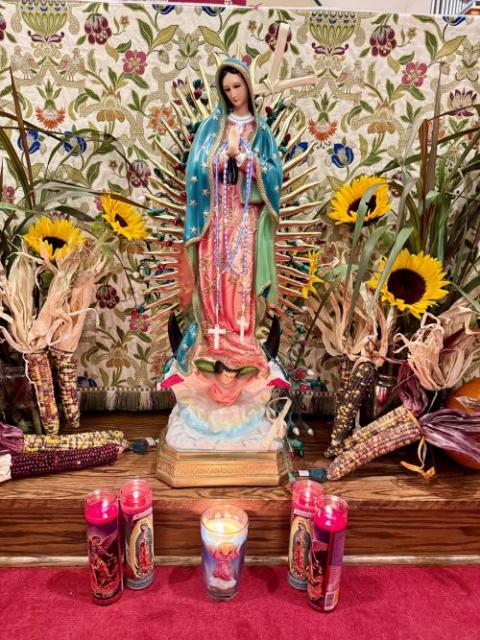Law enforcement officers prevent clergy from entering the Broadview ICE facility and offering Communion to immigrants detained inside, during an outdoor Mass in the Broadview section of Chicago Nov. 1. (OSV News/Leah Millis, Reuters)
I live and serve in Washington, D.C., which, in some ways, is the epicenter of everything going on in the United States. In August, the National Guard landed in my city, pushing out the unhoused community and, with the assistance of U.S. Immigration and Customs Enforcement and the Department of Homeland Security, began to wreak havoc on immigrant communities.
That first week of the occupation, my walk to work was eerie. I wasn't greeted by the people who normally lived under the overpasses seeking shelter from the brutal heat or who spent their days hanging out near my apartment building. The fruit mercado across the street from me was quiet. The steady hum of delivery bikes had slowed, and from the perch of my balcony, I watched a large group of federal agents walk into Union Market. (I walked over to watch their actions). This is just what I saw the first few weeks.
Across the city, homeless encampments were bulldozed and immigrants were terrorized. ICE agents descended on neighborhoods, ripped people from cars, and snatched people on the way to church.
This didn't just happen in my city. It happened in cities and towns across the country. I received calls from friends in Los Angeles, Akron, Cleveland, Cincinnati, Chicago and so many other cities who detailed the same horrific scene: "This person disappeared while going to his regular check-in at ICE." "These people were tear-gassed while participating in a peaceful protest." "This hospital closed."
Personally, I was safe from harm and knew that I could not stay silent. Yet, I wasn't sure what that meant. How was I called to respond? Where did I need to be in this moment?
I think this is a question that many of us have asked over the past months. What is mine to do? What is ours to do? How do we respond when we are afraid?

A statue of Our Lady of Guadalupe, brought by a family, stands as a symbol of hope and solidarity during a prayer vigil in Ohio in June 2025. (Courtesy of Eilis McCulloh)
Last month, in the midst of grappling with my own response to the injustices and attempts to divide us, I was introduced to these lines from the poem "Because" by Rosemerry Wahtola Trommer.
One willing heart can't stop a war.
One willing heart can't feed all the hungry.
And sometimes, daunted by a task too big,
I tell myself what's the use of trying?
But today, the invitation is clear:
to be ridiculously courageous in love.
This poem haunted me for days. The pain of the country — of my community — felt too big to respond to. The entire poem has been a constant source of prayer and reflection for me. What does it look like to be ridiculously courageous in love? How do I respond to this invitation? How are we responding to this invitation?
All it takes is one scroll through social media or one conversation with a friend to see how people across the country are courageously responding to the horror in their own communities. Responding by being ridiculously courageous in love means showing up.
In Chicago, the Coalition for Spiritual and Public Leadership has coordinated prayerful marches and vigils. More than 2,000 people donned bright yellow T-shirts emblazoned with the words of Mary's Magnificat to courageously take the Eucharist to Broadview Detention Center. Twice they have been turned away, but their courageous witness has provided hope to countless others.
Many churches and community groups are participating in the One Church, One Family Initiative. On Oct. 23, many of us joined in prayer in our churches, community centers and outside ICE offices in prayer. I joined with other Catholic leaders in Washington, D.C., outside our local ICE Field Office just a few blocks from the National Mall. We joined together in prayer — for families torn apart, for the people enacting horrific pain as part of immigration raids and enforcement, and for all of us, that we may have the courage to respond. On Nov. 13, more of us will join together in prayerful witness.
Advertisement
Across the country, many of us have prayed outside detention centers and local prisons where our immigrant siblings are detained. In my hometown of Youngstown, Ohio, a small group of faith-filled people gather weekly outside the Mahoning County Jail and CoreCivic. Their constant prayer bears witness to the grave injustices happening in our own city.
Some of our responses aren't as public. In September, I was invited to participate in a prayer vigil for families of the disappeared. Faith leaders representing every denomination in the Ohio town came together for shared prayer. One family brought their statue of Our Lady of Guadalupe. Joined in prayer during the sacred time, we bore witness to the power of faith and community. This was responding courageously in love.
And, still, many people care deeply about the pain of their neighbors. They, too, courageously show up and respond in love through prayer and solidarity with hurting communities. They courageously call for change, call for a country where all people are welcomed and loved, and teach us how to respond in the small movements of our days.
Together, we must remind ourselves that all of our actions respond to the last lines of Trommer's poem: "To love as if it matters, / as if the world depends on it." Right now, the world depends on us to love with our whole hearts and to respond out of that love.




